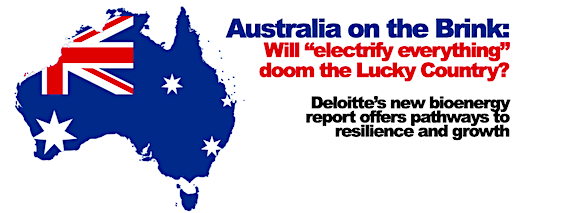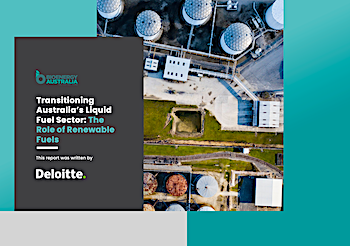Australia on the Brink: will “electrify everything” doom the Lucky Country?

Australia will be exposed to environmental, economic and energy security risks if governments fail to foster a domestic renewable fuels sector, says a new report by Deloitte and commissioned by Bioenergy Australia.
The report is titled Transitioning Australia’s Liquid Fuel Sector: The Role of Renewable Fuels – which addresses decarbonization of Australia’s economy: Especially, it address sectors of the economy where electrification is impractical.
 Australia’s economy, as you have made have read elsewhere, is based heavily on finance and services built atop mining and agriculture, and the vast distances in the Never Never where mining assets are found that place enormous pressure on the nation’s transport and construction sectors. They need to decarbonize, fast, and electrification is not an easy step for the mining industry — electric transmission is one issue, storage another, and electricity’s struggles with heavy lift are a third.
Australia’s economy, as you have made have read elsewhere, is based heavily on finance and services built atop mining and agriculture, and the vast distances in the Never Never where mining assets are found that place enormous pressure on the nation’s transport and construction sectors. They need to decarbonize, fast, and electrification is not an easy step for the mining industry — electric transmission is one issue, storage another, and electricity’s struggles with heavy lift are a third.
One of the preeminent US scientists, Dr. George Huber, has been openly skeptical about the broad application of electrification for heavy-duty transport and also for chemical production. Some of his skepticism relates back to the lack of production systems (such as electrolyzers) that respond to electricity market conditions.
Huber writes here:
“Specifically, we find that, when the electrolysis system is operated in flexible mode (and can respond to dynamics of electricity markets), the associated electricity cost nearly collapses to zero. Conversely, when the unit is not flexible (and cannot respond to markets), the electricity cost comprises 60% of the total cost.”
Big difference. Since electricity market dynamics and chemicals production requirements — and heavy-duty transport — are not generally synchronized, there’s the potential for the kind of spiky prices that disrupt markets. If you lived through California’s brief experiment with market-priced retail power and its horrific collapse, you’ll not want to re-live the experience. You want to have a resilient side system that can supply markets when electricity markets are unaffordable. Just as power markets draw from multiple feedstocks in order to levelize prices as best they can.
The report warns of a “missed economic opportunity that is well and truly being grasped by other nations, with Australia’s bioenergy roadmap claiming that $10 billion in GDP per annum could be added over the next decade with the development of a mature bioenergy sector, along with 26,200 new jobs.” Yet the report found that although “global investment in liquid renewable fuels more than doubled in 2021, reaching approximately US$8 billion….it remains clear that Australia is lagging behind countries like the US, UK, Canada, Brazil, Germany, Sweden and New Zealand.”
Some highlight bullet points on the value-add.
• Replacing just 6% of petrol with bioethanol, based on targets, would be the equivalent of taking 730,000 vehicles off the road.
• Replacing 2% of diesel with biodiesel or renewable diesel, based on current targets, would be the equivalent of taking 29,000 rigid trucks off the road.
• Replacing 10% of jet fuel with Sustainable Aviation Fuel, based on airline targets, would be the equivalent of around 220 million less kms flown annually by a Boeing 747.
The feedstock problem
The problem, of course, is sufficient feedstock. Australia is dry, food security and food exports are established concerns, and there’s been extraordinary disinterest in tapping bioenergy as a climate strategy, or as a value-add boost to agriculture. There’s been more interest in hydrogen and in electric transformation — two sides of the same coin, since green hydrogen in the Aussie vision will be produced from the spare, cheap power that the Deloitte report says will be hard to find.
A SAF opportunity
The Australian Federal Government is set to launch its Jet Council that will oversee the aviation sector’s transition to Sustainable Aviation Fuel, working with all levels of government and industry. However, the report concludes that “without adequate government support, the report concludes, an Australian renewable fuels industry may fail to materialize, ensuring Australia’s transport, mining, agriculture and construction sectors will continue to depend on incumbent fossil fuels, leading to continued greenhouse gas emissions.” We might supplement that with the specter of imported green fuels.
The Bottom Line
The glories of aviation on low-carbon SAF set aside, Australia needs an energy resilience strategy in order to assure continuation of the Aussie way. Will they choose one? It will take first-rate thinking. Many years ago, a university professor of mine, Donald Horne, described Australia thus: “Australia is a lucky country run mainly by second rate people who share its luck. It lives on other people’s ideas, and, although its ordinary people are adaptable, most of its leaders (in all fields) so lack curiosity about the events that surround them that they are often taken by surprise.”
I’ve never endorsed Professor Horne’s thinking on this topic. I would say rather that Australia’s lucky run, based on its rich agricultural and mining resources, is not a streak of good fortune to take for granted, or to think that it will persist no matter how foolish the directives from the top. Well may we call Australia a lucky country; yet a failure to provide a resilient decarbonization strategy for mining and agriculture would be a Blunder from Down Under.
Reaction from the stakeholders
Bioenergy Australia CEO Shahana McKenzie says renewable fuels are the missing piece of the puzzle when it comes to emissions reduction in Australia.
“While electrification is essential for significant pillars of the energy system it is only part of the answer to reducing emissions. Australia’s economy is reliant on liquid fuels, our heavy industries, aviation, marine, agriculture, and mining need affordable and immediate decarbonization options. Touting electrification as the only solution is naïve and delaying a robust discussion about how we achieve decarbonization of these hard-to-abate sectors. The full-throttled pursuit of electrification is going to be a handbrake on Australia’s pursuit of its emissions reduction targets, leaving significant sectors in our economy unable to decarbonize in an affordable, reliable way.”
Category: Top Stories















